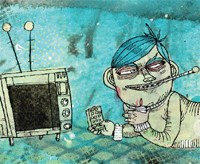 Some of my finest childhood memories are from the days I would opt out of school. I would either be sick or exaggerate the mild discomfort I felt, con(vinc)ing my mind and my parents that I was really ill.
Some of my finest childhood memories are from the days I would opt out of school. I would either be sick or exaggerate the mild discomfort I felt, con(vinc)ing my mind and my parents that I was really ill.
Either way, I felt I deserved a day off, and I would do what had to be done to stay in their bed where I had access to TV, and bask in the pleasure of watching cartoons normally unattainable because of school.
There was a lot of bad Nick Jr. shit on during the day — a lot of stuff created for little kids I grudgingly sat through. But I watched and waited until the show that made it worthwhile came on, the show that affected the way I consume and appreciate serial style cultural creations, the show that fostered my love for the epic saga and was responsible for my obsession with context and completeness: “The Mysterious Cities of Gold.”
The first time I stumbled upon it, I had no idea what was happening. The opening credits showed three children flying a huge mechanical bird. For whatever reason, that blew my nine-year-old mind. It began with a “previously on,” the narrator coming at me with a few weird names and a couple of enigmatic plot points. I didn’t get it, but I tried to follow the action and waited for the bird-plane.
Slowly, I gained a sense of the characters, and I realized the story took place in South America some time way in the past, but with interspersions of futuristic technology. I was still pretty lost, but Esteban was my type of kid, and I really liked the music.
I stayed home again the next day, and I was able to understand a lot of what was happening because the episode was a continuation of the previous one. Now I got it. The show wasn’t intentionally confusing. I had only watched a tiny piece of a massive narrative.
Without a detailed context, I find myself disoriented and disinterested.
After those two days, in the time before DVDs and DVRs, I looked forward to watching the show whenever I was lucky enough to be home in the early afternoon on any given weekday. The series ran from beginning to end and then repeated, so at any time I could be watching events that took place before or after episodes I had previously seen. I was continuously confused, but I always hoped to see the episode with the huge mechanical bird.
Once, for an entire school-break week, I was able to immerse myself in the story. That Friday they began talking about a Golden Condor, and I thought my time had finally come. Instead, I was left with a cliffhanger and the realization the bird-plane would make its first appearance while I was stuck in school on Monday.
Unfortunately, I never got to see how that Golden Condor came about. I saw the solar-powered ship, which was almost as cool, but the Condor remained out of reach until I finally got down to business and bought the entire series on ten VHS tapes off of eBay in 2001.
Recently, I’ve come to understand the importance of “The Mysterious Cities of Gold” in my preferred form and aesthetic. As an adult, I find myself unable to enjoy cultural products without drawn-out plot lines and intricate historical, geographical, and mythological contexts. It’s hard for me to immerse myself in the typical half-hour sitcom because it feels like an insubstantial waste of time.
Instead, I’d rather watch an entire season of a series like “The Wire” with all its cultural, professional, political and regional complexities. Instead, I fill my bookshelf with literary chronicles containing plotlines spanning thousands of pages about individuals and cultures that may or may not exist, but nevertheless are alive with substance.
Instead, I fill my record shelves with the complete works of individuals and groups who have defined and/or defied the customs of a few distinct musical sub-genres. Instead, I define my years alongside the ultimate saga of professional baseball with its endless cycle of pennants, rivalries, dynasties, and its extensive cast of legendary characters.
This is my struggle for complexity and totality. If I want to be involved in something, I need to be aware of the beginning, the end, and everything that comes between. Without a detailed context, I am disoriented and disinterested.
As a society, we are poorly informed. Many problems (especially in the foreign-policy arena) could be dealt with intelligently and efficiently if we increased our focus on understanding historical and cultural context instead of insisting on an agenda that may or may not be applicable.
This is what we should expect of our elected officials and ourselves; however, most people don’t care. They don’t care for context; they don’t care for a rich understanding. Most people care only for what they can draw conclusions about with minimal effort. Most people don’t want to understand; they want to be understood, and I wonder if I’m different because the TV show that gave me respect for context and thoughtful understanding only aired when I was supposed to be in school.
– Column by Andrew Williams, illustration by Ferris Plock
Andrew Williams lives in Brooklyn and battles entropy in Manhattan. He enjoys epic sagas and bicycling.
